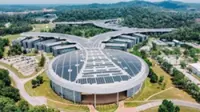PUTRAJAYA: An updated mechanism, which will specifically address ewaste such as EV (electric vehicle) batteries, solar panels and other similar components, will be brought up to the Cabinet.
Natural Resources and Environmental Sustainability Minister Nik Nazmi Nik Ahmad said the move is to efficiently manage the rising electrical and electronic waste, or ewaste, in households.
He said the updated mechanism relevant to the disposal of such waste will be highlighted at the Cabinet meeting.
Nik Nazmi said the updated mechanism will specifically address the latest requirements for managing the increasing ewaste in the country.
“While the campaign (to manage and dispose of ewaste) is important, I agree that we need to look at a specific and structured mechanism for ewaste.
“This is because ewaste is beginning to cover a bigger component of our waste today.
“We are already coming to the end of the life cycle of the batteries of the first generation of hybrid cars,” he said after launching the Gaya Hidup Hijau (Green Lifestyle) campaign at the ministry’s headquarters here yesterday.
Nik Nazmi said a discussion will also be held with relevant ministries in managing ewaste, including the Local Government Development Ministry, Energy Transition and Public Utilities Ministry, and the Investment, Trade and Industry Ministry.
He said the disposal of ewaste will require a whole-of-government approach.
As such, he said the matter should be discussed thoroughly with the ministries involved.
According to the Environment Department (DOE), ewaste is a broken, non-working, old or obsolete electric electronic appliance such as a television, desktop computer, air-conditioner, washing machine or refrigerator.
It is also categorised as Scheduled Wastes under Code SW110, First Schedule, Environmental Quality (Scheduled Wastes) Regulations 2005.
Ewaste is generally divided into two main types, according to its generation sources, namely ewaste generated from the industrial sector and household ewaste.
These items often contain hazardous materials like lead, mercury, cadmium and brominated flame retardants.
When not properly disposed of, ewaste can lead to environmental contamination and health hazards for nearby communities.
There are 195 ewaste collection centres as of 2022, based on a report by the DOE.
On the campaign, Nik Nazmi said it is aimed at promoting the green lifestyle concept among civil servants for them to serve as role models in sustainable practices.
Those working at the ministry can now recycle their plastic bottles with a Reverse Vending Machine powered by artificial intelligence placed at the ministry’s headquarters.
They can also collect points to claim insurance protection for a year through the Trash4Protection initiative.







































